Jan. 6 hearing revelations: Trump called Pence a 'wimp' as VP resisted 'pressure campaign' to overturn election
- Oops!Something went wrong.Please try again later.
- Oops!Something went wrong.Please try again later.
WASHINGTON — House members of the committee investigating the Jan. 6, 2021, attack on the U.S. Capitol detailed Thursday how former President Donald Trump relentlessly pressured his vice president, Mike Pence, to execute a debunked legal theory to reject the results of the 2020 election despite Pence informing him it would be unconstitutional.
Trump's hostility toward Pence, both publicly and privately, endangered the vice president's life and helped fuel the violence on Jan. 6 as members of Congress met to count the electoral votes confirming Joe Biden's victory, the committee alleged.
"When Mike Pence made it clear that he wouldn't give in to Donald Trump's scheme, Donald Trump turned the mob on him," said the committee's chairman, Rep. Bennie Thompson, D-Miss.
More: Trump lawyer who pressured Pence to reject electors asked for pardon after Jan. 6: recap
The baseless legal theory, put forward by attorney John Eastman and embraced by Trump, argued the vice president could reject slates of Biden electors certified by key battleground states in favor of fake Trump electors.
Rep. Liz Cheney, the committee's vice chairwoman, said the strategy wasn't just wrong – "it was illegal and unconstitutional."
Pence declined to testify to the committee, but multiple former Pence aides described in vivid detail the pressure the vice president faced to ignore the Constitution and the jeopardy Pence found himself in as rioters attacked the Capitol.
Here are takeaways from the third hearing on the Jan. 6 committee's findings:
Theory Pence could reject electors was debunked to Trump before Jan. 6
The committee pointed to multiple memos circulated by Eastman in December 2020 that argued Pence could reject slates of "disputed" electors in battleground states that Biden carried.
It hinged on an idea that Trump supporters in key swing states like Michigan, Pennsylvania and Arizona – which Biden won and Trump unsuccessfully challenged – had the power to proclaim themselves electors. With competing slates of electors presented to Congress, Eastman argued Pence had the unilateral power to decide the next president.
"There was no basis in the Constitution or laws of the United States at all with the theory espoused by Mr. Eastman," retired conservative Judge Michael Luttig, who advised Pence on his actions, told the committee. "At all. None."
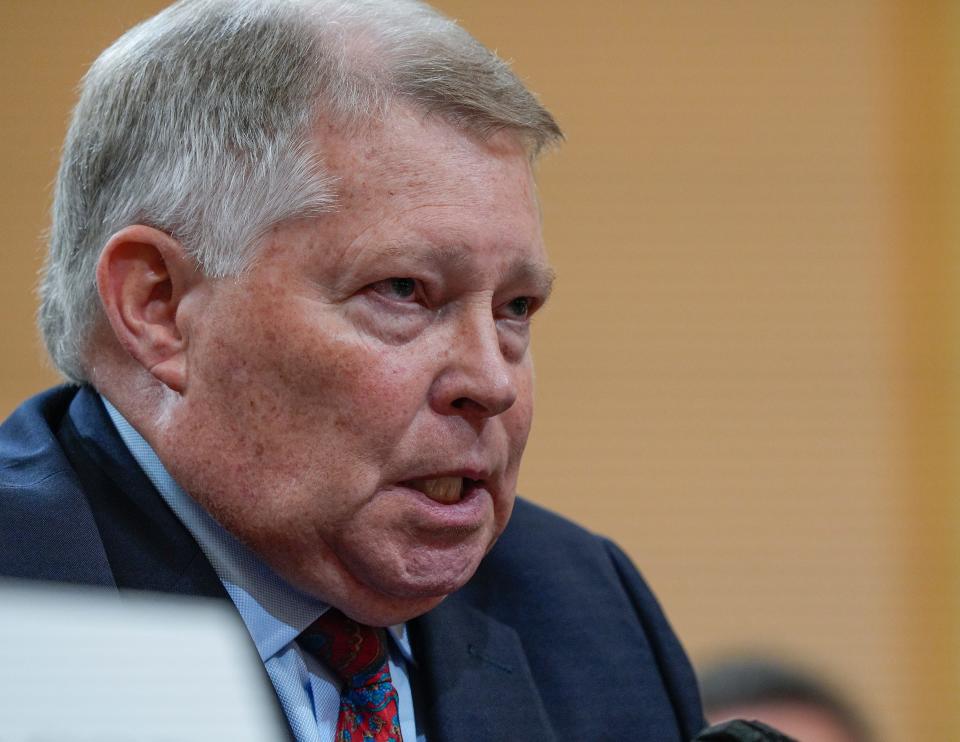
The Constitution's 12th Amendment, which outlines the Electoral College process, says the vice president shall "open all the certificates and the votes shall then be counted." The Electoral Act of 1887 outlines the counting process.
"It is unambiguous that the vice president does not have the authority to reject electors," said Greg Jacob, a lawyer and former chief legal counsel for Pence, adding that only those certified by states are real electors.
Pence relayed that message to Trump.
Marc Short, Pence's chief of staff, said in a videotaped deposition that Pence had not only written a letter to Trump saying he had no such legal authority, but communicated the same thing to Trump “many times” and “very consistently.”
More: Miss Day 3 of the Jan. 6 hearing? Pence's role opposing insurrection takes center stage
Jacob said he and other attorneys reviewed the text of the Constitution, the intent of the Founding Fathers and historic precedence after Pence first inquired about his role in the process to count electoral votes in early December.
“There is almost no idea more un-American than the notion that any one person would choose the American President,” Jacob said. He said Pence "never budged" on his position that he lacked the power.
Luttig said he would have "laid my body across the road before I would have let the vice president overturn the 2020 election," calling Eastman's strategy "constitutional mischief.”
Eastman, who didn't believe his own theory, sought a pardon from Trump
Not only did legal scholars categorically reject Eastman's legal analysis, but Eastman himself doubted that his theory passed constitutional muster, according to Jacob.
After Jan. 6, Eastman sought a presidential pardon from Trump, according to a letter shared by the committee that Eastman wrote to Trump attorney Rudy Giuliani, the former mayor of New York and Trump's attorney.
“I’ve decided that I should be on the pardon list, if that is still in the works,” Eastman wrote.
Jacob recalled a conversation before Jan. 6 that he had with Eastman in which Eastman acknowledged the Supreme Court would likely reject any claim that the vice president could reject the certified electoral votes submitted by states.
“Dr. Eastman never really believed his own theory,” said Rep. Pete Aguilar, D-Calif, one of the House committee members.
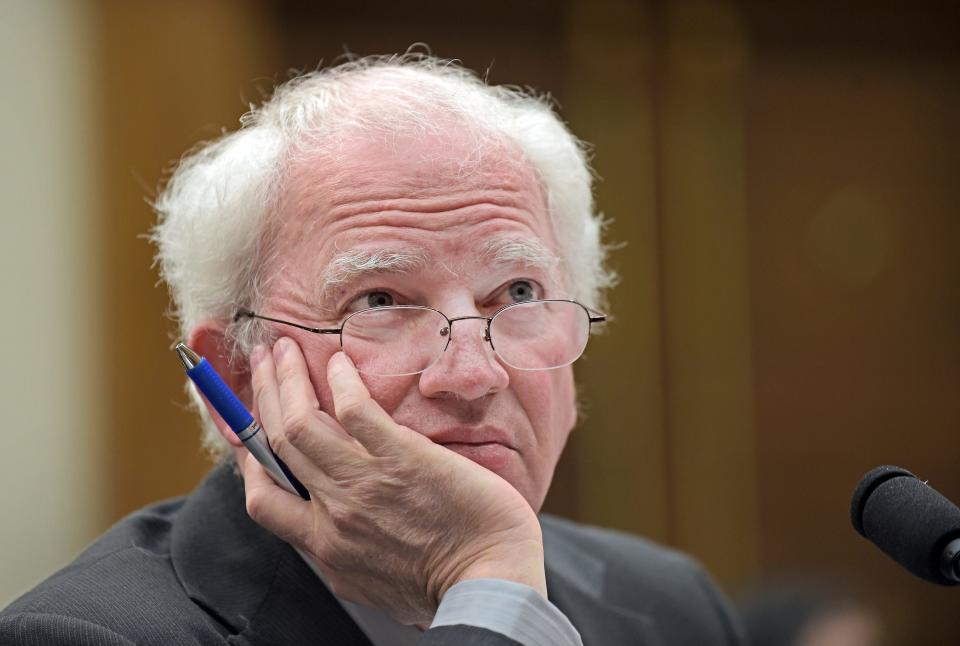
Jacob told the committee that he challenged the logic behind Eastman's argument by reminding him that former Democratic Vice President Al Gore certified his own election loss in 2000.
"If you were right, don't you think Al Gore might have liked to have known in 2000 that he had authority to just declare himself president of the United States?" Jacob asked Eastman.
Eastman argued that Pence, but neither Gore nor Vice President Kamala Harris, had the authority.
"Al Gore did not have a basis to do it in 2000. Kamala Harris shouldn't be able to do it in 2024," Jacob said, recounting Eastman's remarks. "But I think you should do it today."
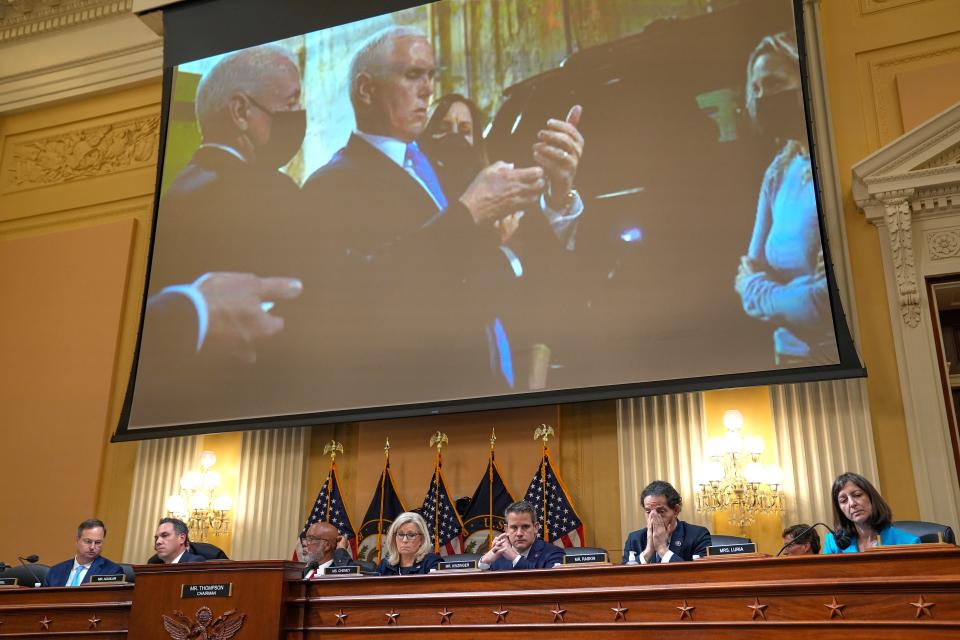
Trump's pressure campaign on Pence heated up before Jan. 6
Aguilar accused Trump of waging a "pressure campaign" targeting Pence to force the vice president to take action that was illegal even as Pence repeatedly told Trump that he lacked the authority.
The congressman said the pressure started in December – pointing to a Dec. 23 tweet by Trump pushing the theory – and was "dialed up" as Jan. 6 approached. He described it as a "multi-week campaign" that included at least one meeting with members of Congress.
"I hope Mike Pence comes through for us," Trump said in a speech in Georgia on Jan. 4, 2021. "He's a great guy. Of course, if he doesn't come through, I won't like him quite as much."
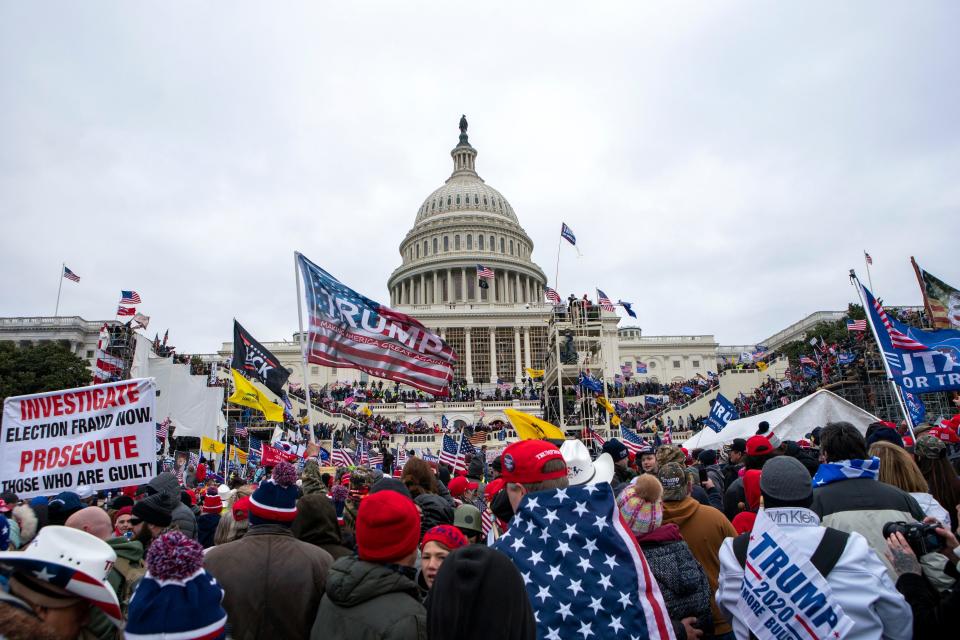
That same day, Eastman advised Pence in a meeting that also included Short and Jacob that Pence had two potential "paths" on Jan 6: Reject electoral votes outright or suspend proceedings and declare a 10-day recess for states in key battleground states to reconvene.
Amid legal questions, Eastman ultimately advised Pence not to follow though on either paths, according to Jacob. But the next day, he flipped his position at the direction of Trump.
“I'm here to request that you reject the electors in the disputed states,” Eastman said on Jan. 5, 2021, according to Jacob’s account.
More: Bill Barr's complicated relationship with Donald Trump: From vital advocate to damning witness
Trump advisor Jason Miller, in a Fox News appearance on Jan. 5, said he believed Pence would "throw down tomorrow and do the right thing." Giuliani and Eastman made similar public statements urging Pence to act, even though they knew the vice president lacked the legal authority, according to witnesses.
On Jan. 5, 2021 the Trump White House put out a false statement that the vice president agreed with Trump that he had the authority to throw out electoral votes.
"We were shocked and disappointed because whoever had written and put that statement out, it was categorically untrue," Jacob told the committee.
As Trump continued to target Pence, the vice president never wavered about his constitutional duty, Short said in videotaped testimony. "Was it painful?" he added. "Sure."
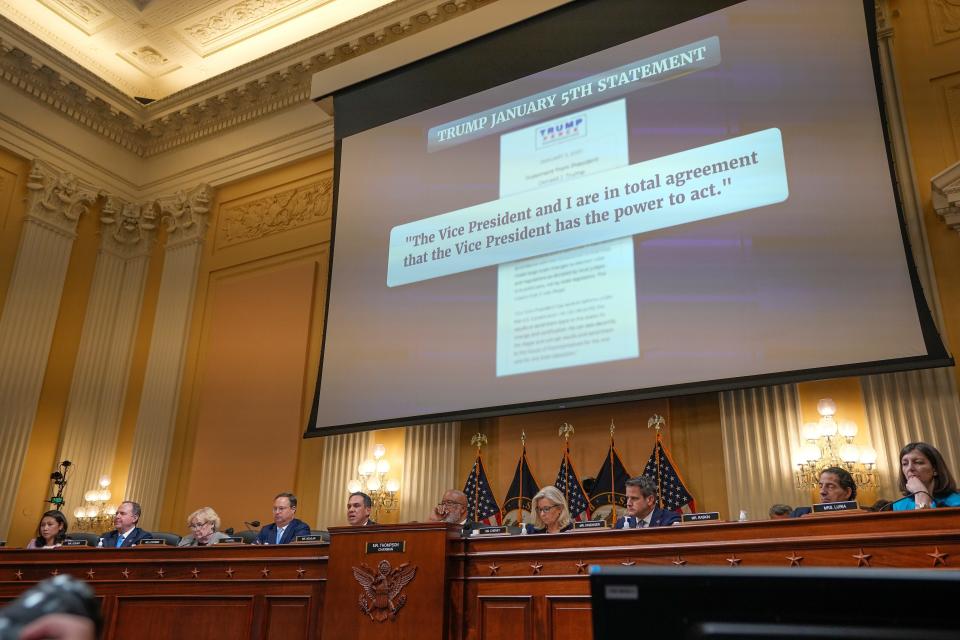
Mob came within 40 feet of Pence after Trump made VP the target
Committee members argued that Trump's push for Pence to unlawfully reject electoral votes made the vice president the top target of insurrectionists on Jan 6, putting his life in danger.
"Bring out Pence! Bring out Pence! Bring out Pence!" rioters chanted in a video shown by the committee. "Hang Mike Pence!" others chanted.
As pro-Trump rioters stormed the Capitol, Pence was taken to a secure location. At one point, according to Aguilar, the mob got within 40 feet of the vice president. While waiting out the attack, Pence made several different calls to others to check on their safety. Aguilar questioned Jacob if Trump called Pence to check on his safety.
“He did not,” replied Jacob, adding that Pence and second lady Karen Pence were frustrated that Trump never reached out.
Committee members pointed to a recent court filing from the Department of Justice that states a confidential informant from the Proud Boys told the FBI that “the Proud Boys would have killed Mike Pence if given a chance.”
In phone call on Jan. 6, Trump called Pence a 'wimp'
On the morning of Jan. 6, 2021, Trump called Pence a "wimp" during a phone call and accused him of lacking the courage to make the right decision, according to White House officials who were also on the call.
“At some point it started off at a calmer tone and then became heated,” Eric Herschmann, a White House lawyer, said of Trump's call from the White House while surrounded by family and advisors.
“The conversation was pretty heated,” said Ivanka Trump, the president’s daughter and senior adviser. “It was a different tone than I’d heard him take with the vice president before.”
Retired Lt. Gen. Keith Kellogg, who served as Pence’s national security adviser, said Trump questioned Pence’s courage, “like you’re not tough enough to make the call.”
Nicholas Luna, who served as Trump’s personal assistant, said he remembered the word “wimp.”
“I don’t remember if he said you are a wimp, you’ll be a wimp,” Luna said. “Wimp is the word I remember.”
Concerns about violence before Jan. 6
Trump administration officials worried about threats targeting Pence – and a broader of fear of nationwide unrest – before the Jan. 6 attack, according to witnesses.
Short told the committee he was concerned Trump could “lash out” at the vice president on Jan. 6, prompting Short the day before to speak to Pence’s head of security detail.
“Marc Short’s concerns were justified. Mike Pence was in danger,” Aguilar said.
Officials working for Trump and Pence warned Eastman that his theory, if executed by Pence, would result in violence. Jacob said he told Eastman that his theory would create a constitutional crisis that “may well have to be decided in the streets.”
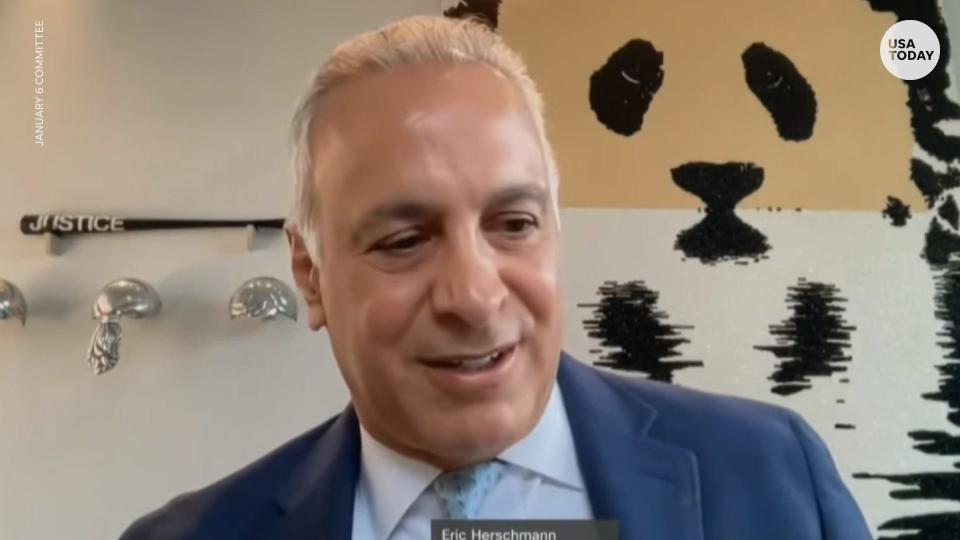
“Are you out of your f’ing mind?” Herschmann said he told Eastman, according to videotaped testimony, adding that “you’re going to cause riots in the streets.”
Fox News host Sean Hannity also worried about the ramifications of Pence declaring Trump the election winner, expressing concerns to White House Chief of Staff Mark Meadows that the White House legal team might resign over Trump's pressure on Pence.
"I'm very worried about the next 48 hours," Hannity texted on Jan. 5, 2021, a day before the insurrection.
'Clear and present danger': A warning that Trump will try again
Luttig, a former federal appeals court judge, concluded the hearing with an impassioned warning that Trump, who has signaled plans to run again for president in 2024, could try to overturn the next presidential election.
"Today, almost two years after that fateful day in January 2021, still Donald Trump and his allies and supporters are a clear and present danger to American democracy," he said.
He said that if Trump or his "anointed successor" loses the 2024 election, they would try to "succeed where they failed" in 2020 to this time overturn the election.
"I don't speak those words lightly," Luttig said. "I would have never spoken those words ever in my life, except that's what the former president and his allies are telling us."
Thompson said the committee will review Luttig's views and recommendations of other legal scholars to explore potential updates to the Electoral Count Act, among other changes.
Reach Joey Garrison on Twitter @joeygarrison.
This article originally appeared on USA TODAY: Jan 6 hearing: Trump called Pence a 'wimp,' Eastman sought pardon

